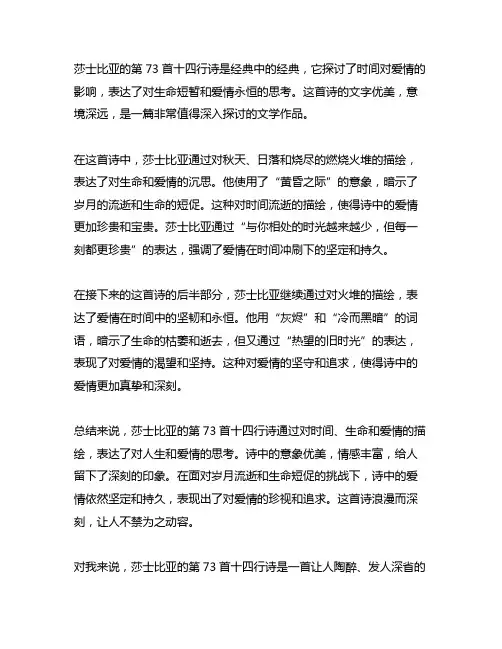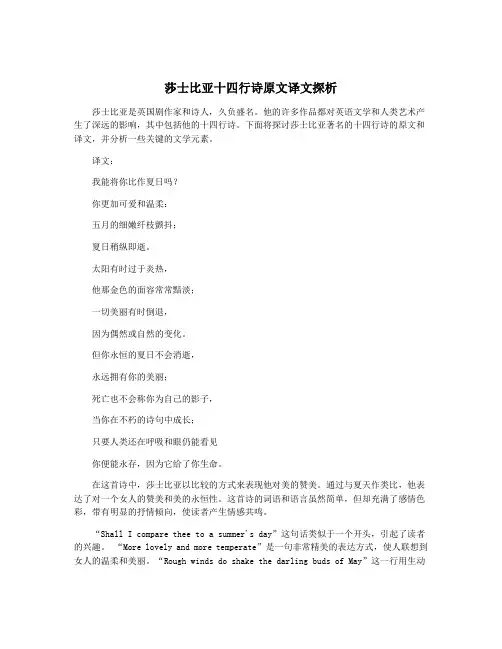《莎士比亚十四行诗·第73首》
莎士比亚第73首十四行诗十三十四行赏析

莎士比亚的第73首十四行诗是经典中的经典,它探讨了时间对爱情的影响,表达了对生命短暂和爱情永恒的思考。
这首诗的文字优美,意境深远,是一篇非常值得深入探讨的文学作品。
在这首诗中,莎士比亚通过对秋天、日落和烧尽的燃烧火堆的描绘,表达了对生命和爱情的沉思。
他使用了“黄昏之际”的意象,暗示了岁月的流逝和生命的短促。
这种对时间流逝的描绘,使得诗中的爱情更加珍贵和宝贵。
莎士比亚通过“与你相处的时光越来越少,但每一刻都更珍贵”的表达,强调了爱情在时间冲刷下的坚定和持久。
在接下来的这首诗的后半部分,莎士比亚继续通过对火堆的描绘,表达了爱情在时间中的坚韧和永恒。
他用“灰烬”和“冷而黑暗”的词语,暗示了生命的枯萎和逝去,但又通过“热望的旧时光”的表达,表现了对爱情的渴望和坚持。
这种对爱情的坚守和追求,使得诗中的爱情更加真挚和深刻。
总结来说,莎士比亚的第73首十四行诗通过对时间、生命和爱情的描绘,表达了对人生和爱情的思考。
诗中的意象优美,情感丰富,给人留下了深刻的印象。
在面对岁月流逝和生命短促的挑战下,诗中的爱情依然坚定和持久,表现出了对爱情的珍视和追求。
这首诗浪漫而深刻,让人不禁为之动容。
对我来说,莎士比亚的第73首十四行诗是一首让人陶醉、发人深省的作品。
它让我反思了人生的短暂和爱情的珍贵,让我更加珍惜眼前的一切,并为了追求真挚的爱情而努力不懈。
它的意境深远,给了我很多启发和感悟,使我对爱情和生命有了更深刻的理解。
这首诗将永远在我的心中留下独一无二的位置,成为我人生中的一盏明灯,指引着我前行。
写到这里,我希望你能够通过我的文章,深入地理解莎士比亚的第73首十四行诗,感受其中蕴含的深刻情感和意境。
愿你也能从中得到启发和感悟,让这首诗成为你人生中的一盏明灯,照亮前行的道路。
莎士比亚在他的第73首十四行诗中展现了对爱情和生命的深刻思考,引人深省。
这首诗中的意象描绘了时间的流逝和生命的短促,同时也呈现了爱情的坚韧和永恒。
诗中的情感和意境让人感到无比动容,也让人对人生有了更深刻的理解。
《莎士比亚十四行诗·第73首》

That time of year thou mayst in me behold When yellow leaves, or none, or few, do hang
在我身上你或许会看见秋天, 当黄叶,或尽脱,或只三三两两
Upon those boughs which shake against the cold, Bare ruin‘d choirs, where late the sweet birds sang.
DEVELOMPENT
First employed by the Italian poets in the early R
Came to perfection Dante especially Petrarch
Introduced into England in the 16c
TWO VARIANTS
In As
ma三fet个e诗trh四)so行uunsseeetsftatdheethtwinilitghhetwoefsstu, ch
day
Which by and by black night doth take away,
Death‘s second self, that seals up all in rest.
Tourism is great.
SONNET
十四行诗,商籁体
A fourteen-line lyric poem, traditionally written in iambic pentameter (抑扬格五音步) .
FEATURES
A fourteen-line lyric poem Each line contains 10 syllables A fixed pattern of RHYME
Sonnet 73

描绘了生命的轮回和人的不朽本性。考虑到人类的死亡,他探索了爱的主题, 尽管年老仍将存在。事实上,他希望他的爱人能理解生命的短暂。对他来说, 死亡会把他们分开因此,他们应该充分利用时间。
That time of year thou mayst in me behold
the poem :“When yellow leaves, or none, or few, do hang”,
• Has used visual imagery such as,
“When yellow leaves” and “boughs which shake against the cold.”
• 威廉·莎士比亚(1564-1616)是文艺复
兴时期英国伟大的剧作家和诗人
• 从诗歌的艺术水平来看,他的十四行
• Judging from the artistic level of poetry, his sonnets 诗是最成功的,一共有154首。
are the most successful, with a total of 154.
That on the ashes of his youth doth lie,
As the death-bed whereon it must expire
Consumed with that which it was nourished by.
在我身上你或许全看见余烬, 它在青春的寒灰里奄奄一息, 在惨淡灵床上早晚总要断魂, 给那滋养过它的烈焰所销毁。
William Shakespeare
• Author • Themes • Figures of speech and meaning • Summary
莎士比亚十四行诗

1From fairest creatures we desire increase;That thereby beauty’s rose might never die;But as the riper should by time deceaseHis tender heir might bear his memory.But thou; contracted to thine own bright eyes;Feed’st thy light’s flame with self-substantial fuel; Making a famine where abundance lies;Thyself thy foe; to thy sweet self too cruel.Thou that art now the world’s fresh ornamentAnd only herald to the gaudy spring;Within thine own bud buriest thy content;And; t ender churl; mak’st waste in niggarding.Pity the world; or else this glutton be;To eat the world’s due; by the grave and thee.惟愿佳丽多成行;美丽玫瑰不断秧;前辈寿终需正寝;娇嫩儿女继芬芳..俊杰自恋太荒唐;迟迟不肯迎新娘..富贵不思成家业;人人为君而悲伤..百花丛中最鲜艳;君乃伦敦第一郎;天下女儿都思君;俊杰为何不大婚别让花芯空枯萎;开花结果理应当;如把青春空挥霍;死后带入坟墓中2When forty winters shall besiege thy browAnd dig deep trenches in thy beauty’s field;Thy youth’s proud livery; so gazed on now;Will be a tattered weed; of small worth held. Then being asked where all thy beauty lies;Where all the treasure of thy lusty days;To say within thine own deep-sunken eyesWere an all-eating shame and thriftless praise. How much more praise deserved thy beauty’s useIf thou couldst answer; “This fair child of mine Shall sum my count and make my old excuse;”Proving his beauty by succession thine.This were to be new made when thou art old;And see thy blood warm when thou feel’st it cold.2四十严冬攻额头;脸上皱纹如鸿沟;青春华服人人颂;老来变成烂布头..如是有人问起你;当年青春在哪里“在我深陷眼窝里;”如此回答真可耻..“当年美貌传子孙;儿女养老又送终..”青春如此来使用;世上无人不称颂..不怕年老手足僵;儿女成长继芬芳..3Look in thy glass and tell the face thou viewest; Now is the time that face should form another; Whose fresh repair if now thou not renewest;Thou dost beguile the world; unbless some mother. For where is she so fair whose uneared womb Disdains the tillage of thy husbandryOr who is he so fond will be the tombOf his self-love; to stop posterityThou art thy mother’s glass; and she in thee Calls back the lovely April of her prime;So thou through windows of thine age shalt see; Despite of wrinkles; this thy golden time.But if thou live remembered not to be;Die single and thine image dies with thee.3快去照镜子;告诉镜中人;时刻已到来;再造镜中人..英俊男青年;如不成大婚;世界将悲哀;减少一母亲..多少美少女;渴望你爱情;盼你来播种;盼你来耕耘 ..纯洁男青年;不要再分心;为何太自恋;断子又绝孙你就是镜子;对于你母亲;母亲的青春;在你身影里;将来你衰老;你也将看到;自己的青春;儿女身影里..如果你不愿;留下美孩儿;老来无人问;美貌葬孤坟 ..4Unthrifty loveliness; why dost thou spendUpon thyself thy beauty’s legacyNature’s bequest gives nothing; but doth lend; And; being frank; she lends to those are free. Then; beauteous niggard; why dost thou abuseThe bounteous largess given thee to give Profitless usurer; why dost thou useSo great a sum of sums yet canst not liveFor having traffic with thyself alone;Thou of thyself thy sweet self dost deceive.Then how when nature calls thee to be gone;What acceptable audit canst thou leaveThy unused beauty must be tombed with thee; Which usèd lives th' executor to be.4风流倜傥美青年;不要整天来游玩;天生丽质天赐你;让她流传到永远..青年朋友别犹豫;坚持独身有何益;别做愚蠢守财奴;腰缠万贯饿肚皮..青年迟迟不大婚;祖宗香火谁继承..何不养育美孩儿;多子多福过一生..青年若听我忠言;不怕死神来敲门;否则将来上西天;风流文采无处寻..5Those hours that with gentle work did frameThe lovely gaze where every eye doth dwellWill play the tyrants to the very sameAnd that unfair which fairly doth excel.For never-resting time leads summer onTo hideous winter and confounds him there;Sap checked with frost and lusty leaves quite gone;Beauty o'er-snowed and bareness everywhere.Then were not summer’s distillation left;A liquid prisoner pent in walls of glass;Beauty’s effect with beauty were bereft;Nor it nor no remembrance what it was.But flowers distilled; though they with winter meet;Lose but their show; their substance still lives sweet. 时间铸造美容颜;贩夫走卒齐惊叹;将来还要施暴戾;使你丑陋人人嫌..无情时间将夏天;拖到冬天来摧残;树脂结冰枝叶枯;美丽埋葬在荒原..如不及时把玫瑰;炼成香水藏瓶内;将来花儿枯萎时;一缕清香无处寻..提炼的花儿得永生;永留芬芳在人间..6Then let not winter’s ragged hand defaceIn thee thy summer; ere thou be distilled.Make sweet some vial; treasure thou some placeWith beauty’s treasure; ere it be self-killed.That use is not forbidden usuryWhich happies those that pay the willing loan;That’s for thyself to breed another thee;Or ten times happier; be it ten for one.Ten times thyself were happier than thou art;If ten of thine ten times refigured thee.Then what could death do if thou shouldst depart; Leaving thee living in posterityBe not self-willed; for thou art much too fairTo be death’s conquest and make worms thine heir. 6别让冬天佝偻手;夺走你的娇丽颜;人生精华需珍惜;生儿育女莫迟疑 ..这不是放高利贷;还钱的人多愉快;是要你再生一个你;生得越多越痛快..生出十个都像你;你的幸福增十倍;活在后代身影里;死神拿你也无奈..好朋友;别拖延;不要让蛆虫;做你继承人..7Lo; in the Orient when the gracious lightLifts up his burning head; each under eyeDoth homage to his new-appearing sight;Serving with looks his sacred majesty;And having climbed the steep-up heavenly hill; Resembling strong youth in his middle age;Yet mortal looks adore his beauty still;Attending on his golden pilgrimage.But when from highmost pitch; with weary car;Like feeble age he reeleth from the day;The eyes; 'fore duteous; now converted areFrom his low tract and look another way.So thou; thyself out-going in thy noon;Unlooked on diest unless thou get a son.红日冉冉升蓝天;光芒万道照人寰;如同天使来人间;凡夫俗子尽开颜..太阳继续升上天;如同健儿正青春;世人尤赞其美貌;万众瞩目伴旅程 ..一旦越过天峰顶;疲态毕露车马昏;凡人转眼望它处;左顾右盼若失魂..风流倜傥美青年;成家立业理当然;如无子孙留人间;晚年孤独好辛酸..8Music to hear; why hear’st thou music sadlySweets with sweets war not; joy delights in joy.Why lov’st thou that which thou receiv’st not gladly; Or else receiv’st with pleasure thine annoyIf the true concord of well-tuned sounds;By unions married; do offend thine ear;They do but sweetly chide thee; who confoundsIn singleness the parts that thou shouldst bear.Mark how one string; sweet husband to another; Strikes each in each by mutual ordering; Resembling sire and child and happy mother;Who all in one; one pleasing note do sing;Whose speechless song; being many; seeming one; Sings this to thee: “Thou single wilt prove none.”天籁之声绕耳畔;俊杰为何要悲伤自寻烦恼有何益;不要辜负好时光..如果动人鲁提琴;打扰你的好心情;她们正在责备你;为何没有小家庭..请听群弦齐奋响;仙乐飘飘处处闻;如同娇妻和孩儿;莺声燕语规劝您;音乐虽然无词语;异曲同工意思同;如无儿女留人间;老来孤独又心酸..9Is it for fear to wet a widow’s eyeThat thou consum’st thyself in single lifeAh; if thou issueless shalt hap to die;The world will wail thee like a makeless wife;The world will be thy widow and still weep;That thou no form of thee hast left behind;When every private widow well may keep;By children’s eyes; her husband’s shape in mind. Look what an unthrift in the world doth spend Shifts but his place; for still the world enjoys it; But beauty’s w aste hath in the world an end;And kept unused; the user so destroys it.No love toward others in that bosom sitsThat on himself such murd'rous shame commits.担心寡妇会哭泣;独身主义过一生;你如死去无孩儿;世界将为你哭泣..世界将成你寡妇;美人一去无踪影..留得儿女在人间;美貌才能永相传..浪子虽然挥霍钱;金钱仍然在人间..青春一去无踪影;不用也会消耗完..如把青春空挥霍;死后带入坟墓中..10For shame deny that thou bear’st love to any; Who for thyself art so unprovident.Grant if thou wilt; thou art belov’d of many;But that thou none lov’st is most evident;For thou art so possessed with murd'rous hateThat ‘gainst thyself thou stick’st not to conspire; Seeking that beauteous roof to ruinateWhich to repair should be thy chief desire.O change thy thought; that I may change my mind. Shall hate be fairer lodged than gentle loveBe as thy presence is; gracious and kind;Or to thyself at least kind-hearted prove.Make thee another self for love of me;That beauty still may live in thine or thee.别说你还有爱心;对自己也不关心;虽然人人喜欢你;你却不爱任何人..撒旦占据你心灵;你想孤独过一生;迟迟不愿成家业;人人为君而担心..风流倜傥美青年;请听愚兄一忠言;青春一去不复还;两人世界比蜜甜..早日娶回美贤妻;生活幸福又温馨..为爱我再生一个你;风流文采永相传..。
莎士比亚最经典的九首十四行诗,一生至少要读一次!

莎士比亚最经典的九首十四行诗,一生至少要读一次!威廉·莎士比亚,是英国文学史上最杰出的戏剧家,也是欧洲文艺复兴时期最重要、最伟大的作家,全世界最卓越的文学家之一。
莎士比亚流传下来的作品包括39部戏剧、154首十四行诗、两首长叙事诗。
今天就来欣赏下莎士比亚的十四行诗!1. 宁可卑劣宁可卑劣,也不愿负卑劣的虚名,当我们的清白蒙上不白之冤,当正当的娱乐被人妄加恶声,不体察我们的感情,只凭偏见。
为什么别人虚伪淫猥的眼睛有权赞扬或诋毁我活跃的血?专侦伺我的弱点而比我坏的人为什么把我认为善的恣意污蔑?我就是我,他们对于我的诋毁只能够宣扬他们自己的卑鄙:我本方正,他们的视线自不轨;这种坏心眼怎么配把我非议?除非他们固执这糊涂的邪说:恶是人性,统治着世间的是恶。
2. 爱是亘古长明的灯塔我绝不承认两颗真心的结合,会有任何障碍;爱算不得真爱,若是一看见人家改变便转舵,或者一看见人家转弯便离开。
哦,绝不!爱是亘古长明的灯塔,它定睛望着风暴却兀不为动;爱又是指引迷舟的一颗恒星,你可量它多高,它所值却无穷。
爱不受时光的播弄,尽管红颜和皓齿难免遭受时光的毒手;爱并不因瞬息的改变而改变,它巍然矗立直到末日的尽头。
我这话若说错,并被证明不确,就算我没写诗,也没人真爱过。
3. 我怎么能够把你来比作夏天怎么能够把你来比作夏天?你不独比它可爱也比它温婉狂风把五月宠爱的嫩蕊作践,夏天出凭的期限由未免太短天上的眼睛有时照得太酷烈它那炳耀的金颜又常遭掩蔽被机缘或无常的天道所摧折,没有芳艳不终于凋残或销毁但是你的长夏永远不会凋落也不会损失你这皎洁的红芳或死神夸口你在他的影里漂泊当你在不朽的诗里与时同长只要有人类,或人有眼睛,这诗将长存,并赐给你生命。
4. 你的爱怜抹掉那世俗的讥谗你的爱怜抹掉那世俗的讥谗,打在我额上的耻辱的烙印;别人的毁誉对我有什么相干,你既表扬我的善又把恶遮隐!你是我整个宇宙,我必须努力从你的口里听取我的荣和辱;我把别人,别人把我,都当作死,谁能使我的铁心肠变善或变恶?别人的意见我全扔入了深渊,那么干净,我简直像聋蛇一般,凭他奉承或诽谤都充耳不闻。
莎士比亚十四行诗原文译文探析

莎士比亚十四行诗原文译文探析莎士比亚是英国剧作家和诗人,久负盛名。
他的许多作品都对英语文学和人类艺术产生了深远的影响,其中包括他的十四行诗。
下面将探讨莎士比亚著名的十四行诗的原文和译文,并分析一些关键的文学元素。
译文:我能将你比作夏日吗?你更加可爱和温柔:五月的细嫩纤枝颤抖;夏日稍纵即逝。
太阳有时过于炎热,他那金色的面容常常黯淡;一切美丽有时倒退,因为偶然或自然的变化。
但你永恒的夏日不会消逝,永远拥有你的美丽;死亡也不会称你为自己的影子,当你在不朽的诗句中成长;只要人类还在呼吸和眼仍能看见你便能永存,因为它给了你生命。
在这首诗中,莎士比亚以比较的方式来表现他对美的赞美。
通过与夏天作类比,他表达了对一个女人的赞美和美的永恒性。
这首诗的词语和语言虽然简单,但却充满了感情色彩,带有明显的抒情倾向,使读者产生情感共鸣。
“Shall I compare thee to a summer's day”这句话类似于一个开头,引起了读者的兴趣。
“More lovely and more temperate”是一句非常精美的表达方式,使人联想到女人的温柔和美丽。
“Rough winds do shake the darling buds of May”这一行用生动的画面展现了夏季的局限性。
接下来,他直言不讳地表达了夏天的缺陷,这是一个关键的反讽,它显示了女人的美丽是超越这些不完美的时令的。
在这首诗的后半部分,莎士比亚开始描述这个女人的永恒美。
他使用非常强的语言来表达它,并表明即使在死亡面前,女人的美丽也将变得不朽。
他用“eternal summer”这个词组来形容这个女人的美丽,这个词组也意味着女人的美丽永恒不变。
他认为,女人的美丽被永远编入了他的诗中,这使得读者可以享受到它的永恒和不朽性。
总之,莎士比亚的十四行诗是一首非常美丽的情诗,它不仅用美丽的文字述说女人的美丽,还有真挚的情感,使读者可以很好地体会到他想传达的思想。
认知隐喻的视角赏析莎士比亚第73首十四行诗
认知隐喻的视角赏析莎士比亚第73首十四行诗1. 引言在文学作品中,隐喻是一种常见的修辞手法,它通过比喻、象征等手段来表达抽象、深刻的意义。
而在认知科学中,认知隐喻则是指人们用来理解抽象概念的心理模型。
莎士比亚是英国文学史上的一位伟大诗人,他的十四行诗也被广泛地研究和赏析。
在本文中,我们将以认知隐喻的视角,来赏析莎士比亚的第73首十四行诗,探讨其中所蕴含的深刻内涵。
2. 莎士比亚第73首十四行诗赏析这首诗以老年和生命的衰败为主题,通过秋天树叶的凋零、日蚀的渐变,表达了人的生命也会随着时间的流逝而走向衰老和末日。
在这些描述中,莎士比亚以自然界的景象,来比喻人生的现实,这就是典型的认知隐喻。
通过对自然现象的描绘和比拟,莎士比亚让读者产生强烈的共鸣,引发对生命和时光流逝的深刻思考。
3. 认知隐喻在诗中的运用在这首诗中,莎士比亚运用了大量的认知隐喻,通过对季节更替、自然现象的描绘,来表达对生命的理解和感悟。
“黄昏之阳”传达了衰老的概念,“寒冬”则暗示着生命的枯萎,“残阳”象征着生命的残缺,这些都是认知隐喻的运用。
通过将抽象的概念与具体的景象相联系,莎士比亚巧妙地引导读者思考,让他们通过对自然景象的观察,来深刻理解生命的意义。
4. 总结与展望通过对莎士比亚第73首十四行诗的赏析,我们不仅对诗歌本身有了更深刻的理解,同时也加深了对认知隐喻的认识。
认知隐喻让人们通过对具体事物的观察,来理解抽象概念,这种心理模型的运用丰富了诗歌的内涵,也让读者更容易产生共鸣。
在未来的学习和实践中,我们可以更多地关注认知隐喻的运用,来提升自己的写作能力和修辞功力。
5. 个人观点个人而言,在赏析莎士比亚的诗歌时,我更加注重其中所蕴含的深刻内涵和情感共鸣。
认知隐喻的视角让我更深入地理解诗意,也更易于将诗歌应用到自己的写作中。
我相信,在今后的学习和实践中,我将更多地运用认知隐喻的方法,来提升自己的文章质量,并通过深度和广度的挖掘,让读者产生强烈的共鸣。
诗歌:《在我身上你或许会看见秋天》莎士比亚
诗歌:《在我身上你或许会看见秋天》莎士比亚《在我身上你或许会看见秋天》莎士比亚十四行诗第七十三首在我身上你或许会看见秋天,当黄叶,或尽脱,或只三三两两挂在瑟缩的枯枝上索索抖颤——荒废的歌坛,曾是鸟儿合唱的地方。
在我身上你或许会看见暮霭,它在日落后向西方徐徐消退:黑夜,死的化身,渐渐把它赶开,严静的安息笼住纷纭的万类。
在我身上你或许会看见余烬,它在青春的寒灰里奄奄一息,在惨淡灵床上早晚总要断魂,给那滋养过它的烈焰所销毁。
看见了这些,你的爱就会加强,因为他转瞬要辞你溘然长往。
(梁宗岱译)英文:That time of year thou may’st in me beholdWhen yellow leaves,or none,or few, do hangUpon those boughs which shake against the cold,Bare ruined choirs where late the sweet birds sang, In me thou see’st the twilight of such dayAs after sunset fadeth in the west,When by and by black night doth take away,Death’s second self, that seals up all in rest.In me thou see’st the glowing of such fire,That on the ashes of his youth doth lie.As the deathbed whereon it must expire, Consumed with that which it was nourished by.This you perceivest, which makes thy love more strong, To love that well which thou must leave ere long.。
莎士比亚著名十四行诗三首
莎士比亚著名十四行诗三首莎士比亚是英国文学史上最杰出的戏剧家,也是西方文艺史上最杰出的作家之一,全世界最卓越的文学家之一。
他流传下来的作品包括37部戏剧、155首十四行诗、两首长叙事诗和其他诗歌。
他的戏剧有各种主要语言的译本,且表演次数远远超过其他任何戏剧家的作品。
下面是店铺为大家带来莎士比亚著名十四行诗三首,希望大家喜欢!莎士比亚经典十四行诗:My tongue-tied Muse in manners holds her still,While comments of your praise, richly compiled,Reserve their character with golden quillAnd precious phrase by all the Muses filed.I think good thoughts whilst other write good words,And like unletter'd clerk still cry 'Amen'To every hymn that able spirit affordsIn polish'd form of well-refined pen.Hearing you praised, I say ''Tis so, 'tis true,'And to the most of praise add something more;But that is in my thought, whose love to you,Though words come hindmost, holds his rank before.Then others for the breath of words respect,Me for my dumb thoughts, speaking in effect.我的缄口的诗神只脉脉无语;他们对你的美评却累牍连篇,用金笔刻成辉煌夺目的大字,和经过一切艺神雕琢的名言。
莎士比亚十四行诗
莎士比亚十四行诗莎士比亚是英国文学史上最杰出的戏剧家,也是西方文艺史上最杰出的作家之一,全世界最卓越的文学家之一。
他流传下来的作品包括37部戏剧、155首十四行诗、两首长叙事诗和其他诗歌。
他的戏剧有各种主要语言的译本,且表演次数远远超过其他任何戏剧家的作品。
下面是店铺为大家带来莎士比亚十四行诗,希望大家喜欢!莎士比亚十四行诗:Or whether doth my mind, being crown'd with you,Drink up the monarch's plague, this flattery?Or whether shall I say, mine eye saith true,And that your love taught it this alchemy,To make of monsters and things indigestSuch cherubins as your sweet self resemble,Creating every bad a perfect best,As fast as objects to his beams assemble?O,'tis the first; 'tis flattery in my seeing,And my great mind most kingly drinks it up:Mine eye well knows what with his gust is 'greeing,And to his palate doth prepare the cup:If it be poison'd, 'tis the lesser sinThat mine eye loves it and doth first begin.是否我的心,既把你当王冠戴,喝过帝王们的鸩毒--自我阿谀?还是我该说,我眼睛说的全对,因为你的爱教会它这炼金术,使它能够把一切蛇神和牛鬼转化为和你一样柔媚的天婴,把每个丑恶改造成尽善尽美,只要事物在它的柔辉下现形?哦,是前者;是眼睛的自我陶醉,我伟大的心灵把它一口喝尽:眼睛晓得投合我心灵的口味,为它准备好这杯可口的毒饮。
- 1、下载文档前请自行甄别文档内容的完整性,平台不提供额外的编辑、内容补充、找答案等附加服务。
- 2、"仅部分预览"的文档,不可在线预览部分如存在完整性等问题,可反馈申请退款(可完整预览的文档不适用该条件!)。
- 3、如文档侵犯您的权益,请联系客服反馈,我们会尽快为您处理(人工客服工作时间:9:00-18:30)。
• In me thou seest the twilight of such day As after sunset fadeth in the west,
• 在我身上你或许会看见暮霭, 它在日落后向西方徐徐消退:
• Which by and by black night doth take away, Death‘s second self, that seals up all in rest.
它在青春的寒灰里奄奄一息, 在惨淡灵床上早晚总要断魂, 给那滋养过它的烈焰所销毁。
by
看见了这些,你的爱就会加强,
This thou perceivest, which makes thy love more strong,
因为他转瞬要辞你溘然长往。
To love that well which thou must leave ere
away,
开,
Death‘s second self, that seals up all in 严静的安息笼住纷纭的万类。
rest. In me thou see‘st the glowing of such fire
在我身上你或许会看见余烬,
That on the ashes of his youth doth lie, 它在青春的寒灰里奄奄一息,
long.
• That time of year thou mayst in me behold When yellow leaves, or none, or few, do hang
• 在我身上你或许会看见秋天, 当黄叶,或尽脱,或只三三两两
Upon those boughs which shake against the cold, Bare ruin‘d choirs, where late the sweet birds sang.
SONNET 73
• That time of year thou mayst in me behold When yellow leaves, or none, or few, do hang Upon those boughs which shake against the cold, Bare ruin‘d choirs, where late the sweet birds sang. In me thou seest the twilight of such day As after sunset fadeth in the west, Which by and by black night doth take away, Death‘s second self, that seals up all in rest. In me thou see‘st the glowing of such fire That on the ashes of his youth doth lie, As the death-bed whereon it must expire Consumed with that which it was nourish‘d by This thou perceivest, which makes thy love more strong, To love that well which thou must leave ere long.
• The Italian or Petrarchan sonnet ; rime scheme:abba,abba,cdcdcd or abba,abba,cdecde
• The English or Shakespearen sonnet ;rime scheme:abab cdcd efef gg
• 英国英格兰中部城市,有 莎士比亚纪念馆与图书馆、 美术馆、皇家莎士比亚剧 院等现代化建筑群。游览 业甚盛。
• Shakespeare Memorial Museum and library, art gallery, the Royal Shakespeare theatre and other modern buildings.
•That time of year thou mayst in me behold
•在我身上你或许会看见秋天,
When yellow leaves, or none, or few, do 当黄叶,或尽脱,或只三三两
hang
两
Upon those boughs which shake against the cold, Bare ruin‘d choirs, where late the sweet
挂在瑟缩的枯枝上索索抖颤-荒废的歌坛,那里百鸟曾合唱。
birds sang.
在我身上你或许会看见暮霭,
In me thou seest the twilight of such day 它在日落后向西方徐徐消退:
As after sunset fadeth in the west,
Which by and by black night doth take 黑夜,死的化身,渐渐把它赶
In me thou see‘st the glowing of such fire
That on the ashes of his youth doth lie,
As the death-bed whereon it must expire ConscuomupeAldet(w双ith that which it was nourish‘d by This tho韵u体p)erceivest, which makes thy love more strong, To love that well which thou must leave ere long.
abab,cdcd,efef,gg
SONNET 73
• That time of year thou mayst in me behold When yellow leaves, or none, or few, do hang Upon those boughs which shake against the cold,
• 在我身上你或许会看见秋天, 当黄叶,或尽脱,或只三三两两 挂在瑟缩的枯枝上索索抖颤-荒废的歌坛,那里百鸟曾合唱。
Bare ruin‘d choirs, where late the sweet
在我身上你或许会看见暮霭,
birds sang. In me thou seest the twilight of such day As after sunset fadeth in the west, Which by and by black night doth take away,
• 在惨淡灵床上早晚总要断魂, 给那滋养过它的烈焰所销毁。
• This thou perceivest, which makes thy love more strong, To love that well which thou must leave ere long.
• 看见了这些,你的爱就会加强, 因为他转瞬要辞你溘然长往。
THEME
By describing his miserable life ,the poet expressed his desire for his friend’s love. The poem told us that we should seize the day to pay more attention to our friends. LELOMPENT
• First employed by the Italian poets in the early R
• Came to perfection Dante especially Petrarch
• Introduced into England in the 16c
TWO VARIANTS
• Tourism is great.
SONNET
• 十四行诗,商籁体
• A fourteen-line lyric poem, traditionally written in iambic pentameter (抑扬格五音步).
FEATURES
• A fourteen-line lyric poem • Each line contains 10 syllables • A fixed pattern of RHYME
SONNET 73
• That time of year thou mayst in me behold
When yellow leaves, or none, or few, do hang
UponTthhreoese boughs which shake against the cold,
Barqeurautrianin‘ds(choirs, where late the sweet birds sang.
As the death-bed whereon it must expire 在惨淡灵床上早晚总要断魂,
Consumed with that which it was nourish‘d by
给那滋养过它的烈焰所销毁。
This thou perceivest, which makes thy 看见了这些,你的爱就会加强,
• 黑夜,死的化身,渐渐把它赶开, 严静的安息笼住纷纭的万类。
• In me thou see‘st the glowing of such fire That on the ashes of his youth doth lie,
• 在我身上你或许会看见余烬, 它在青春的寒灰里奄奄一息,
• As the death-bed whereon it must expire Consumed with that which it was nourish‘d by
